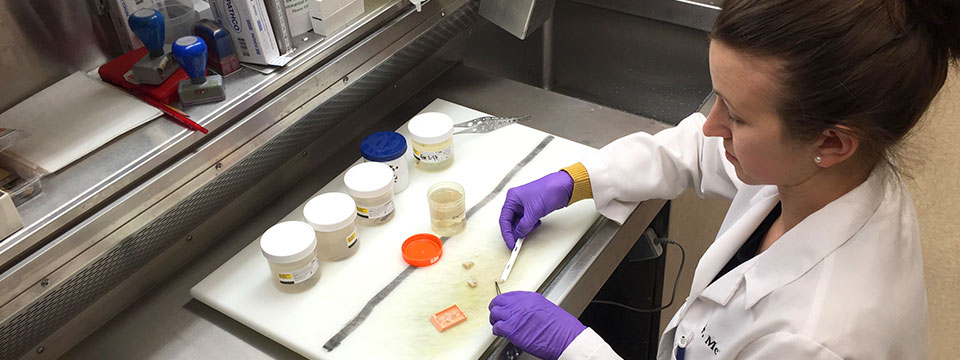
The diagnostic pathology services in the Department of Veterinary Pathology, College of Veterinary Medicine rely on their reputation and word-of-mouth to let veterinarians across the state know about their services.
That strategy seems to be paying off. For the first time ever, the annual revenue for department’s Veterinary Diagnostic Services has surpassed $1 million. The 2015 figures are quite a jump from the $95,000 in annual revenues that was the norm back in the early to mid-’90s.
“We have consistently grown over the past two decades,” said Phyllis Fisher, manager of the Clinical Pathology and Histopathology Labs. “For instance we only received $4500 in referral work for our clinical pathology labs from local veterinarians in 1993. This past year we had more than $159,000 in outside revenue.”
The Veterinary Pathology Diagnostic Services specializes in meeting the diagnostic needs of all species for clinical pathology, histopathology and parasitology in addition to a focus area in companion animal diagnostics.
The increased demand for the labs’ services isn’t limited to clinical pathology. The histopathology area (biopsies, tissue samples) has more than doubled since 2003. Fisher says there are several reasons for the unprecedented growth including new technology used to disseminate results.
“Historically we started out sending results through the mail and also with phone calls,” Fisher said. “We have evolved to sending the results via FAX, email and now through a secure website.”
Fisher believes electronic communication has proven to be a driver of the additional business.
“We are getting more web-ordered submissions all the time,” she said. “I believe our recent graduates are more used to using this technology and desire to get their results electronically.”
Fisher points to recent graduates as another reason for the revenue growth.
“Our former students are becoming our clients,” she said. “I believe they like the level of expertise we can offer them.” Most veterinary practices handle their own routine pathology testing including those for heartworms in dogs and feline leukemia.
“These tests require smaller instruments and they can get quicker results for their patients and clients,” Fisher said. “But we’re getting more and more tests because our referring veterinarians like the level of expertise our labs and technicians can offer them.
“Big labs offer the same type of resources we do, but our referring veterinarians know our pathologists and know they can get better and faster personal results through them,” Fisher said.
A majority of the submissions the Veterinary Pathology Diagnostic Services receives from referring veterinarians come from the immediate Ames area, including one local veterinary practice that sends a majority of its lab work to the College of Veterinary Medicine. But veterinarians in Iowa and throughout the Midwest also utilize the service and the labs serve the needs of the Lloyd Veterinary Medical Center in the College of Veterinary Medicine.
“Most referring veterinarians will do basic lab work in their practices,” Fisher said. “But if they require additional expertise, Iowa State is the go-to lab for them.”
February 2016
